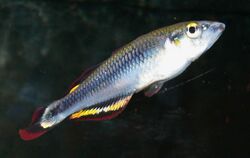Biology:Bedotiinae
| Bedotiinae | |
|---|---|

| |
| Bedotia madagascariensis | |
| Scientific classification | |
| Kingdom: | Animalia |
| Phylum: | Chordata |
| Class: | Actinopterygii |
| Order: | Atheriniformes |
| Family: | Melanotaeniidae |
| Subfamily: | Bedotiinae Regan, 1903 |
| Genera | |
Bedotiinae are a subfamily of the rainbowfish family Melanotaeniidae, commonly known as the Madagascar rainbowfish, Madagascan rainbowfish, or Malagasy rainbowfish due to their endemism to Madagascar . It includes two genera, Bedotia and Rheocles.
Anatomy and morphology
As the common name rainbowfish implies, they are generally colorful fishes. Bedotiins are elongated, laterally compressed, and rarely exceed 100 mm in standard length. Bedotiins exhibit varying degrees of sexual dimorphism, which is quite pronounced in some species.[1] The anal fin spine is weak or absent.[2]
Distribution
The entire family of Bedotiidae is endemic to Madagascar .[1] Bedotiins occur exclusively in freshwater environments and are distributed in small to medium-sized forested rivers and streams, occasionally in swamps and marshes, spanning nearly the entire eastern slope of Madagascar (R. derhami is recorded from a westward draining Sofia River basin in the northeast of the island).[1][3]
Bedotiin fishes are under severe threat because of rapid deforestation and habitat modification throughout most of their range. Because Bedotia and Rheocles are generally the first to exhibit population declines or disappear from areas where habitat is moderately to highly disturbed or degraded, they are reliable indicators of ecosystem health and stability.[4]
Taxonomy
This subfamily includes the two genera Bedotia and Rheocles, with at least 16 species.[2] This subfamily is monophyletic.[1][5] This group is considered by Nelson, 2016 Fishes of the World to be a subfamily of the family Melanotaeniidae.[6] When treated as a family it has been placed by some authorities in a suborder Melanotaenioidei which includes the sister groups Bedotiidae and Melanotaeniidae, as well as Pseudomugilidae (including Telmatherininae).[1] The sister-group relationship between these taxa is most parsimoniously explained by the break-up of Gondwana.[1]
References
- ↑ 1.0 1.1 1.2 1.3 1.4 1.5 Sparks, John S.; Smith, W. Leo (2004). "Phylogeny and biogeography of the Malagasy and Australasian rainbowfishes (Teleostei: Melanotaenioidei): Gondwanan vicariance and evolution in freshwater". Molecular Phylogenetics and Evolution 33 (3): 719–734. doi:10.1016/j.ympev.2004.07.002. PMID 15522799. http://research.amnh.org/scicomp/pdfs/Sparks_Smith2004b.pdf.
- ↑ 2.0 2.1 Nelson, Joseph S. (2006). Fishes of the World. John Wiley & Sons , Inc. ISBN 0-471-25031-7. OCLC 224053746.
- ↑ Sparks, John S.; Rush, Leila M. R. (2005). "A new rainbowfish (Teleostei: Melanotaenioidei: Bedotiidae) from the southeastern highlands of Madagascar, with comments on the biogeography of Bedotia". Zootaxa 1051: 39–54. doi:10.11646/zootaxa.1051.1.4. http://www.mapress.com/zootaxa/2005f/z01051p054f.pdf.
- ↑ Sparks, John S.; Schaefer, S. A. (2001). Schaefer, S. A.. ed. "Bedotia masoala: A New Species of Atherinoid Rainbowfish (Teleostei: Bedotiidae) from the Masoala Peninsula, Northeastern Madagascar". Copeia 2001 (2): 482–489. doi:10.1643/0045-8511(2001)001[0482:BMANSO2.0.CO;2].
- ↑ Stiassny, Melanie L. J. (August 7, 1990). Notes on the Anatomy and Relationships of the Bedotiid Fishes of Madagascar, with a Taxonomic Revision of the Genus Rheocles (Atherinomorpha: Bedotiidae). pp. 1–33. http://digitallibrary.amnh.org/dspace/bitstream/2246/5063/1/N2979.pdf.
- ↑ J. S. Nelson; T. C. Grande; M. V. H. Wilson (2016). Fishes of the World (5th ed.). Wiley. pp. 358–363. ISBN 978-1-118-34233-6. https://sites.google.com/site/fotw5th/. Retrieved 2019-06-28.
Wikidata ☰ Q135874 entry
